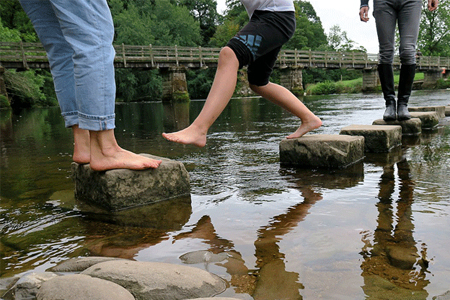Jesus began to make it clear to his disciples that he was destined to go to Jerusalem and suffer grievously at the hands of the elders and chief priests and scribes, to be put to death and to be raised up on the third day. Then, taking him aside, Peter started to remonstrate with him. ‘Heaven preserve you Lord,’ he said. ‘This must not happen to you.’ But he turned and said to Peter, ‘Get behind me, Satan! You are an obstacle in my path, because the way you think is not God’s but man’s.’
Then Jesus said to his disciples, ‘If anyone wants to be a follower of mine, let him renounce himself and take up his cross and follow me. For anyone who wants to save his life will lose it; but anyone who loses his life for my sake will find it. What, then, will a man gain if he wins the whole world and ruins his life? Or what has a man to offer in exchange for his life?
For the Son of Man is going to come in the glory of his Father with his angels, and, when he does, he will reward each one according to his behaviour.’ (Matthew 16:21-27)
Reflection - Finding real life
What a contrast there is between last Sunday’s Gospel, when Peter was proclaimed the ‘rock’ on which the church would be built, and this Sunday when Jesus rebukes him for being a different kind of rock - a ‘stumbling block’!
When Jesus starts to talk about his suffering, death and resurrection, it’s more than Peter can cope with - “This must not happen to you.” This is exactly what Jesus was afraid of when he bound the disciples to silence about his true identity in last Sunday’s Gospel. He was afraid that they would think of him as a warrior leading a victorious uprising against the Roman occupation of Israel - the popular image of the Messiah in Jesus’ day.
Last week, Jesus proclaimed Peter ‘blessed’ because of his God-given insight into who Jesus is. Now Peter is ‘Satan’ because it is not God-given insight, but human thinking, he now shows.
Can we cope with having a shepherd-king rather than a warrior-king as our God and Saviour?
Jesus then starts talking about the call of discipleship. First of all, it has to be freely chosen. Discipleship is not something which can be forced on people. Second, the disciple must learn to put God and others at the centre of his/her life. This is not some pious idea. People in true, loving relationships, especially parents, know exactly what it means to ‘take up your cross’ and follow Jesus by doing loving acts of service everyday - to put another’s needs ahead of your own. Such people save their lives by living human life as Jesus taught and as God intended.
Those who set about trying to ‘save’ their lives through power, wealth and a comfortable life eventually lose the little life they have. Nothing can prevent the moment of death when all that is stripped away and becomes meaningless. That’s what the lines about gaining the whole world and ruining your life mean.
At the end of the day, the faithfulness of the disciple, shown in loving deeds, will be rewarded.
What Jesus says about discipleship is a very different way to live and seems totally opposite to the values of modern society where we think we are in control of our destiny; where life is about amassing wealth and living comfortably for ourselves rather than for others.
Read and and download our prayers and reflections for this Sunday.
pdf
Celebrating At Home 22nd Sunday in Ordinary Time [PDF]
Celebrating At Home 22nd Sunday in Ordinary Time [ePub]















